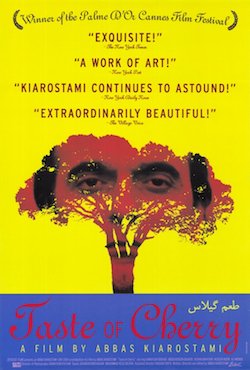Tags
1990s film, Abbas Kiarostami, art film, cinema, film, film of the 1990s, film review, Iran, Iranian film, Kiarostami, minimalism, minimalist film, movie review, movies
 1997
1997
Directed by Abbas Kiarostami
Abbas Kiarostami’s minimalistic and downcast drama Taste of Cherry proved to be massively divisive upon its release, tying for the prestigious Palme d’Or at Cannes and savaged by certain reviewers and dull and self-indulgent. Twenty years on, it’s arguably Kiarostami’s finest moment – a richly layered and deeply humanistic portrait of impenetrable despair.
Presented in a detached tone, the audience is immediately thrust into the mindset of Mr. Badii (Homayoun Ershadi). He aimlessly drives around, expressionless, apparently searching for something. From the outset only two things are clear – he has money to spare, and he needs help with an unusual task. Throughout, as three men come and go from the passenger seat of his car, we witness a cathartic and perhaps fruitless evisceration of his very soul.
It’s easy to see why some responded with derision to the film; Its obliqueness could easily read as obscurity for its own sake, but arguably Kiarostami leaves exactly the right amount unsaid to avoid clouding what is actually a very universal story. As much as Mr. Badii is the centre of the film, of equal importance are the string of people who he encounters in his most desperate hours. With nuanced and realistic dialogue, the audience gets a strong sense of who each character is, their hopes, and their fears.
Rarely are characters shown on-screen together. Though throughout the film little more than the gorgeous rust-coloured countryside and the inside of Mr. Badii’s car are shown, but the images are created and deployed so artfully that they cumulatively create a sense of isolation more immediate than even the dialogue can create. The late afternoon melancholy that floods the film can almost be felt through its visuals.
The odd coda that closes Taste of Cherry is also likely to be a point of contention. Continuing Kiarostami’s fascination with metafiction (see Close-Up, 1990), the rug is pulled out from under the audience as the film reaches its emotional and thematic crescendo. What it ultimately means is hard to specify, but the deeply human centre of seems multiplied and magnified by its astonishing ending.
